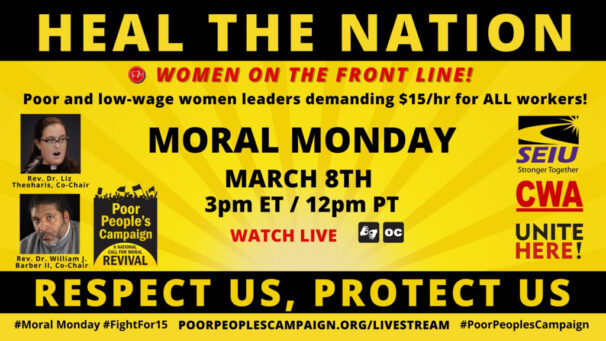
The coronavirus pandemic and the economic depression it sparked have highlighted what women workers have known for a long time: The minimum wage is not a living wage. CEOs keep wages low while their own pay and corporate profits continue to skyrocket.
Today, on International Women’s Day, the Poor People’s Campaign: A Call for Moral Revival will highlight the struggles of poor and low-income women and the need for COVID relief and the $15 per hour minimum wage.
At the Moral Monday event scheduled for 3 p.m. Eastern, poor and low-income people from several states, along with faith leaders and representatives of SEIU, CWA, and UNITE HERE, will join the co-chairs of the Poor People’s Campaign, Rev. Dr. Liz Theoharis and Rev. Dr. William J. Barber II, will shine a spotlight on how women workers have been affected by the crisis.
Speaking to People’s World on Monday morning, Theoharis said, “The best way to honor women this International Women’s Day is to raise the minimum wage to $15 immediately, expand health care, guarantee an adequate income for all, and pass policies that allow people to thrive not just barely survive.”
Women workers have been especially hard hit by the pandemic: a waitress loses her job and income when a restaurant closes, a factory worker is forced to drop out of the workforce to do childcare and supervise her children’s online education, a nurse has to take time off to look after a family member who’s contracted the virus, or an office worker suddenly finds herself doing her job on the computer at home while still raising a family and doing household chores.
For many, staying at home—always their second workplace—has imposed new burdens during the crisis. They are forced to take on even more tasks as teachers, caregivers, and more while still working their “regular” jobs—if they’re fortunate enough to still have one.
Then there’s the stress of working for poverty wages—harsh already in non-pandemic times, even more so in the middle of a plague. At $7.25 ($2.13 for tipped workers), the federal minimum wage is a starvation wage, adding up to a little over $15,000 annually for 40 hours of labor a week.
It is mostly women and people of color who earn these wages, with women making up 58% of low-wage workers. Most frontline workers are women, and they are risking their lives and those of their loved ones for shockingly low pay.
“In the United States, there are 74 million poor and low-income women,” Theoharis said, “and in this pandemic, women have been disproportionately impacted by unemployment, remote school, and increased care responsibilities. On International Women’s Day and every day, it is our duty to lift the load of poverty for all”
International Women’s Day is historically rooted in the causes of these women workers. It began with a 1909 celebration in Chicago, where over 1,500 women gathered to demand economic and political equality. Well over a century later, the demands remain relevant.
 At today’s live event, labor leaders and the PPC will demand that senators and the White House make good on their promise to pass the $15 per hour minimum wage. The stripping of the $15 wage of the Senate version of the American Relief Plan wage was a setback, but the fight for a decent wage continues. Advocates are keeping up the pressure for the fight for $15 to be taken up as a separate measure.
At today’s live event, labor leaders and the PPC will demand that senators and the White House make good on their promise to pass the $15 per hour minimum wage. The stripping of the $15 wage of the Senate version of the American Relief Plan wage was a setback, but the fight for a decent wage continues. Advocates are keeping up the pressure for the fight for $15 to be taken up as a separate measure.
But even more is needed for workers to have the dignity and respect deserved. The PPC is also calling for health care for all, a guaranteed income, and a federal jobs program that guarantees everyone with employment.
International Women’s Day has long been associated with the fight for equity and justice for all workers—a tradition that continues today.










